Of Bears and Men
Air Date: Week of January 30, 2009

A bear dances on the streets of Bulgaria. (Photo: Mihai Vasile/VIER PFOTEN)
For centuries, captive bears have made money for their gypsy owners by dancing in the streets of Europe. But thanks to the efforts of actress Bridget Bardot and an Austrian animal rights group, the last of the dancing bears have been placed in a cushy retirement home in the mountains of Bulgaria. And, as reporter Matthew Brunwasser reports, that isn’t sitting well with some of the local humans.
Transcript
GELLERMAN: Since the 1970s French actress Bridgette Bardot has turned away from films and devoted her energies to animal rights. A few years ago, Bardot was instrumental in creating a refuge for dancing bears - bears that once performed on the streets of Europe.
The reserve was built in the mountains of southwestern Bulgaria but for many residents there, the animals are better off than they are. From Belitsa, Bulgaria, Matthew Brunwasser has our report.
[MUSIC, CHAINS JINGLING AND SOMEONE SPEAKING IN GERMAN]
BRUNWASSER: Wandering gypsies, leading bears in chains, have performed across Europe since the Middle Ages, in scenes like this one. Taken from the 1996 documentary film “Of Bears and Men,” it shows a bear-keeper and his dancing bear busking for German tourists on Bulgaria’s black sea coast.
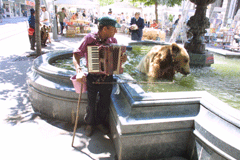
A dancing bear before rescue.(Photo: Mihai Vasile/VIER PFOTEN)
BRUNWASSER: In the modern era, the antiquated tradition has only survived in the Balkans and former Soviet Republics, where people believed that touching a bear could bring good luck. Or that if a bear lay on top of you, it could cure back pain. But after Western animal rights groups came to Bulgaria in the 90s, they publicized the severe pain suffered by the bears, controlled by steel rings through their fleshy, dog-like noses. In another scene from the film by Asen Vladimirov, a bear cub is taught to “dance” by being forced to walk on hot coals.
[BABY BEAR GROWLING, CHAINS JINGLING]
BRUNWASSER: The last Bulgarian bears were purchased two years ago. Animal rights activists paid about five thousand dollars for each one, so their human owners could find a new trade, that didn’t involve harming animals. And to take care of the bears, an animal rights group, Four Paws, and Bridgette Bardot built an enormous bear park.
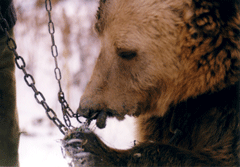
(Photo: Mihai Vasile/VIER PFOTEN)
[SOUND OF BEAR WALKING ON GRAVEL]
BRUNWASSER: Its hard to hear in this recording, but this former dancing bear, now free in the park, is pacing three steps forward, two steps back, despite the fact that it now has 30 acres of wilderness in which to roam. Unaccustomed to life without chains, most of the bears continue this “dance,” for months or even years after their release.
[BEARS BREATHING AND LIP-SMACKING]
BRUNWASSER: Their deluxe living space also includes a varied and plentiful food, which comes regularly.
[SOUND OF BREAD HITTING THE GROUND, BEAR MIP SMACKING]
BRUNWASSER: That’s the sound of loaves of bread, tossed from the top of the visitors’ center into the fenced-off habitat for bears. The food too speaks of the bears’ lifetime of captivity and the company of humans. It's not what they would have eaten in the wild. Dimitar Ivanov is the manager of the park.
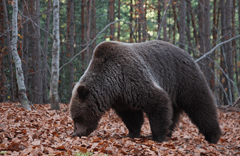
Enjoying retirement.(Photo: Mihai Vasile/VIER PFOTEN)
[TERRITORIAL THROATY BEAR ROARS]
BRUNWASSER: This bear is not shy about expressing its instinct to protect its territory, even though there is plenty for all.
[BEAR GROWLING]
BRUNWASSER: Besides caring for the bears, the park’s mission is to educate visitors about wildlife and animal cruelty. Most of the bears’ faces are scarred or shredded. And they will never again be able to survive in the wild. All the males were castrated when they arrived at the park, so when the last bear dies of old age, the park will have completed its function.
[BEAR ROARS]
BRUNWASSER: For Belitsa’s human residents however, the future is not so bright. The last 20 years of political and economic changes following the end of communism have hit Belitsa hard. The small factories where people use to work here have crumbled. People in Belitsa don’t talk about reducing their carbon footprints, or transportation with a low environmental impact. They live it.
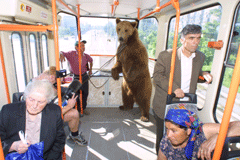
(Photo: Mihai Vasile/VIER PFOTEN)
BRUNWASSER: I hitched a ride with Mitko Dimitrov and his crew of woodcutters as they commuted to work up into the mountains on a horse-drawn cart. We passed people working large gardens by hand. Almost everyone eats organic and local here, but not out of choice. The bears on the other hand, don’t have to worry. Dimitrov says the people in town are jealous of their bears. There’s even a saying: there’s nothing better than to be a bear in Belitsa.
DIMITROV: (IN BULGARIAN) The people in Belitsa are hungry, the bears eat. That’s the whole thing. I see a lot of food going to the bears, an obscene amount of food. They bring them pears, huge, fresh and juicy. Big white juicy grapes, the eating kind. The bears in Belitsa live better than the people.
BRUNWASSER: Dimitrov’s income is around two hundred dollars a month, the same as each bear’s food budget. He’s never visited the park, but not because he holds any grudges.
DIMITROV: (IN BULGARIAN) It’s interesting, but you need to have money to go up there and look at the bears, Euros. And for the last three months, we haven’t even been able to take off a single day for a weekend. Not one single day!
[STREET NOISE]
BRUNWASSER: In contrast to the majestic Alpine scenery, the streets of Belitsa are scrappy, dirty and do-it-yourself. Maria Bankova is sitting in front of her house, taking a break from chores. She wants to show me how rough her hands are, despite her profession as a math teacher. If you don’t work the land here, you don’t eat. Bankova says the money from abroad could be used for more important things.
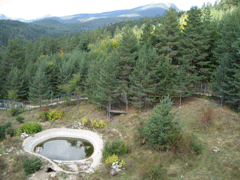
The bear park.(Photo: Mihai Vasile/VIER PFOTEN)
BRUNWASSER: The older generation, raised during communism, has trouble accepting the free market, as well as the values of capitalism. Bankova finds it unfair that animals enjoy right to dignity, while people have to use all their energy just to survive.
BANKOVA: I can tell you honestly, if I worked for the bears, I would secretly take from their food and bring it home for my family to eat. If no one was looking.
BRUNWASSER: Economically, the park has not been felt much yet in Belitsa, beyond its small staff and local produce sellers. But Belitsa’s young people are able to see the potential benefits. They are far more comfortable with the values of the post-communist era.
[CAFÉ SOUNDS, MUSIC “HEY HEY, YOU YOU I WANT TO BE YOUR GIRLFRIEND”]
BRUNWASSER: The Elite café is the most popular hangout for Belitsa youth. Alexi Grancharov, hanging out with friends and smoking cigarettes, says he has hopes.
GRANCHAROV: (IN BULGARIAN) As the park develops more, there will be more work places and people wont have to leave Belitsa to work and live. They will stay in Belitsa. Now there are very few young people still left in Belitsa because there is no work here. After high school everyone leaves to find work somewhere else.
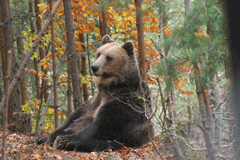
(Photo: Mihai Vasile/VIER PFOTEN)
[RESTAURANT SOUNDS]
BRUNWASSER: Here in the restaurant, you can find out of town guests and locals who have done well in the free market. All the visitors to the bear park who spend the night in Belitsa end up staying here. It’s the only hotel in town. According to Georgi Vasilev, the son of the owner, the region’s economic backwardness means the mountains are largely untouched. He says it will inevitably attract tourists who seek quiet and natural beauty.
VASILEV: This is maybe I see only this way the future of Belitsa. Because it’s only the nature we can, we can use. The nature is not touched by anything. It was like this before 100 years, it’s like this now.
BRUNWASSER: Human attempts to control nature often have unintended consequences. This includes efforts to shape the nature of human beings. While the bears are visibly thriving, the results for the bear-keepers have been mixed. One former bear-keeper, who cashed out of the trade, was seen in a later film, busking on the streets of Sofia with a monkey.
[MUSIC]
BRUNWASSER: For Living On Earth, I'm Matthew Brunwasser.
Living on Earth wants to hear from you!
Living on Earth
62 Calef Highway, Suite 212
Lee, NH 03861
Telephone: 617-287-4121
E-mail: comments@loe.org
Newsletter [Click here]
Donate to Living on Earth!
Living on Earth is an independent media program and relies entirely on contributions from listeners and institutions supporting public service. Please donate now to preserve an independent environmental voice.
NewsletterLiving on Earth offers a weekly delivery of the show's rundown to your mailbox. Sign up for our newsletter today!
 Sailors For The Sea: Be the change you want to sea.
Sailors For The Sea: Be the change you want to sea.
 The Grantham Foundation for the Protection of the Environment: Committed to protecting and improving the health of the global environment.
The Grantham Foundation for the Protection of the Environment: Committed to protecting and improving the health of the global environment.
 Contribute to Living on Earth and receive, as our gift to you, an archival print of one of Mark Seth Lender's extraordinary wildlife photographs. Follow the link to see Mark's current collection of photographs.
Contribute to Living on Earth and receive, as our gift to you, an archival print of one of Mark Seth Lender's extraordinary wildlife photographs. Follow the link to see Mark's current collection of photographs.
 Buy a signed copy of Mark Seth Lender's book Smeagull the Seagull & support Living on Earth
Buy a signed copy of Mark Seth Lender's book Smeagull the Seagull & support Living on Earth

